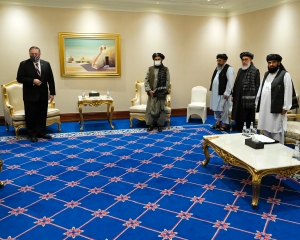What are the societal and political consequences of the recognition of armed non-state actors (ANSAs) in the context of asymmetric conflicts? In the new PRIF Report, authors Hanna Pfeifer, Anna Geis and Maéva Clément discuss diverse contemporary examples and present the state of research on recognition dynamics. They shed light on the ambivalences of recognition practises and “thick recognition” in asymmetric conflicts, revealing dilemmas and unintended consequences. The three authors recommend further empirical research and knowledge transfer among practitioners, researchers, and policymakers to better understand the dynamics and draw benefits for international security and conflict management.
Prof Dr Anna Geis holds a professorship in Political Science with a focus on international security and conflict studies at the Helmut Schmidt University in Hamburg. Dr Maéva Clément is Lecturer in International Relations and Peace and Conflict Studies at the Institute of Social Sciences, Osnabrück University.
